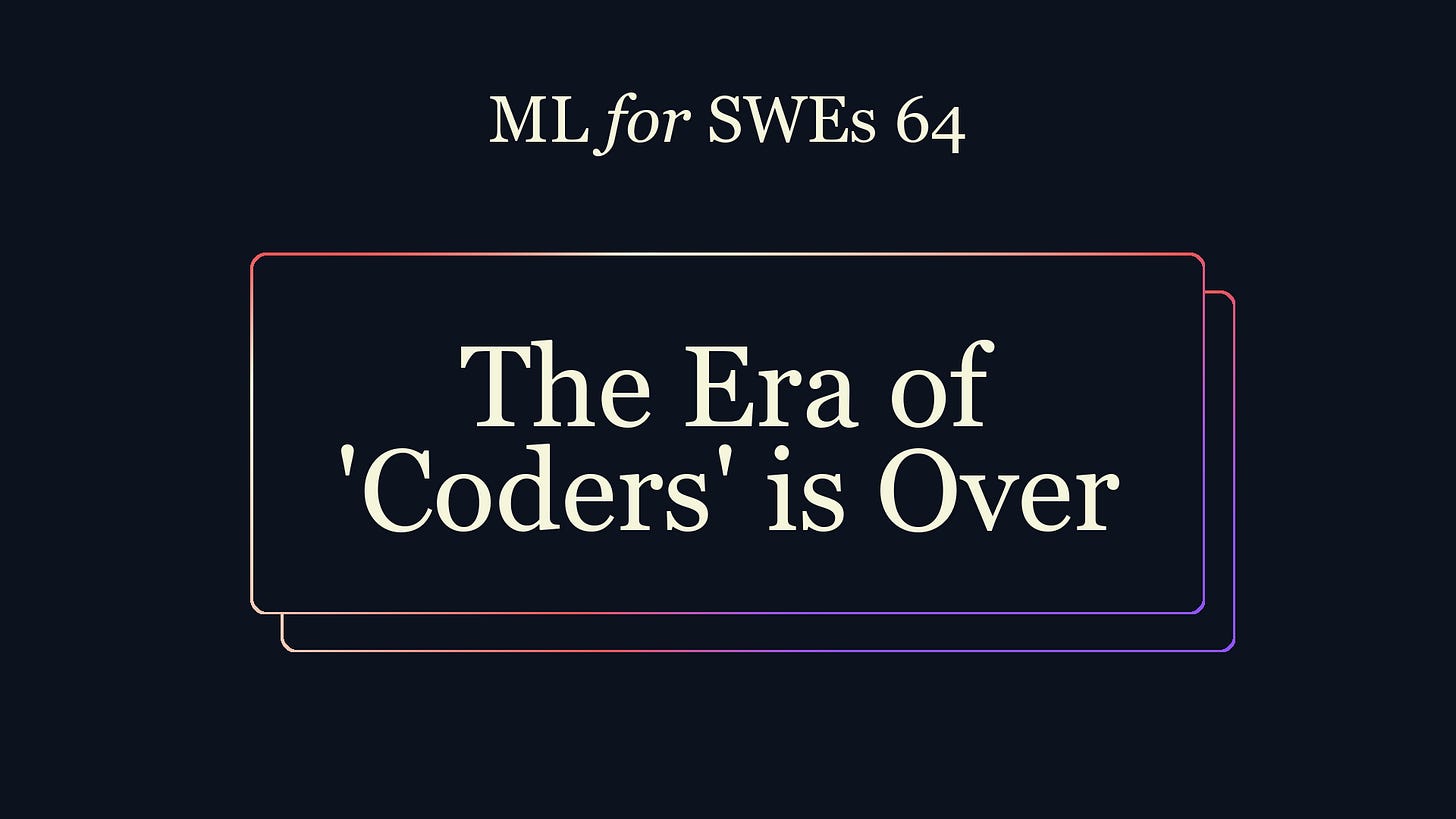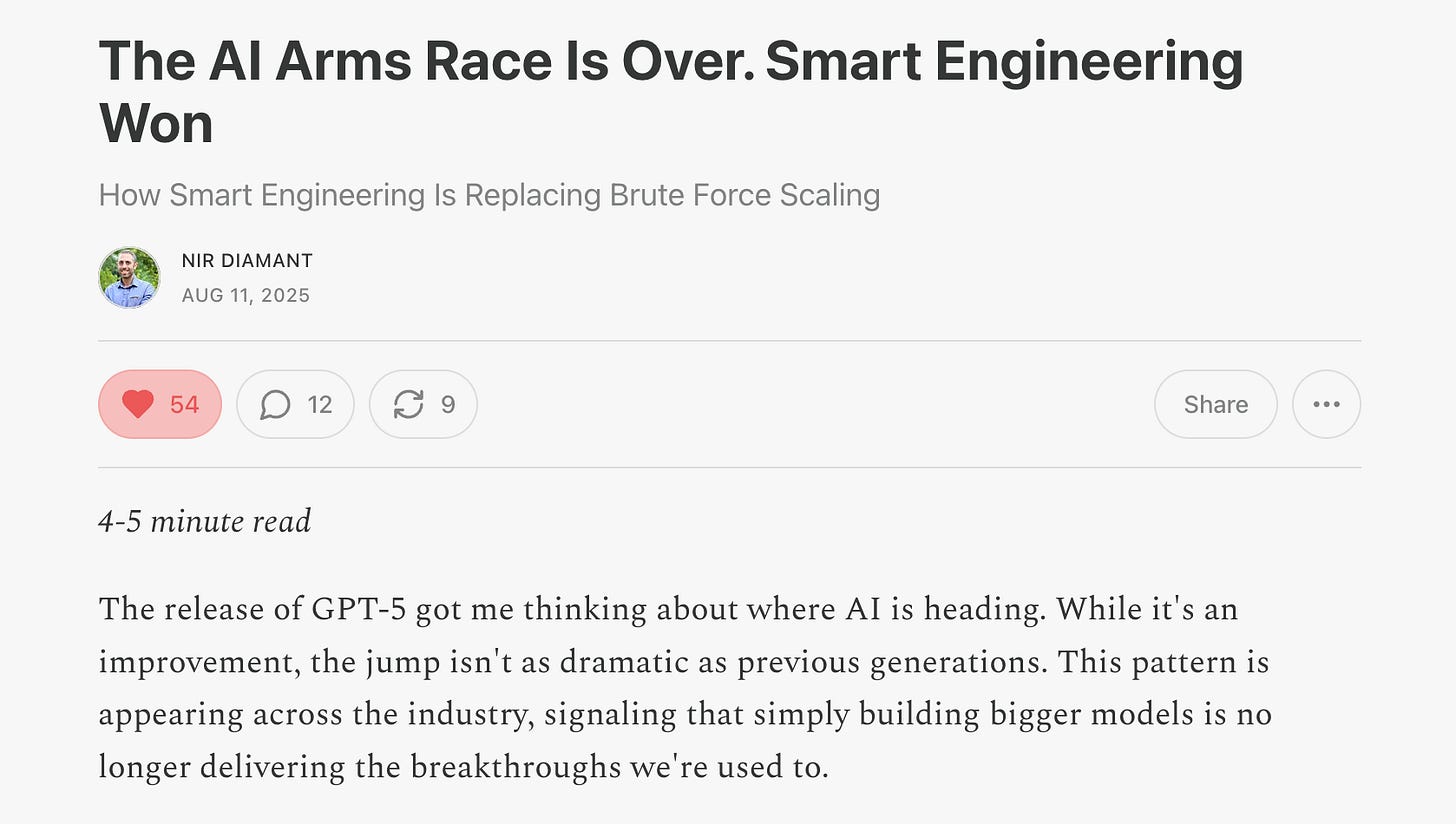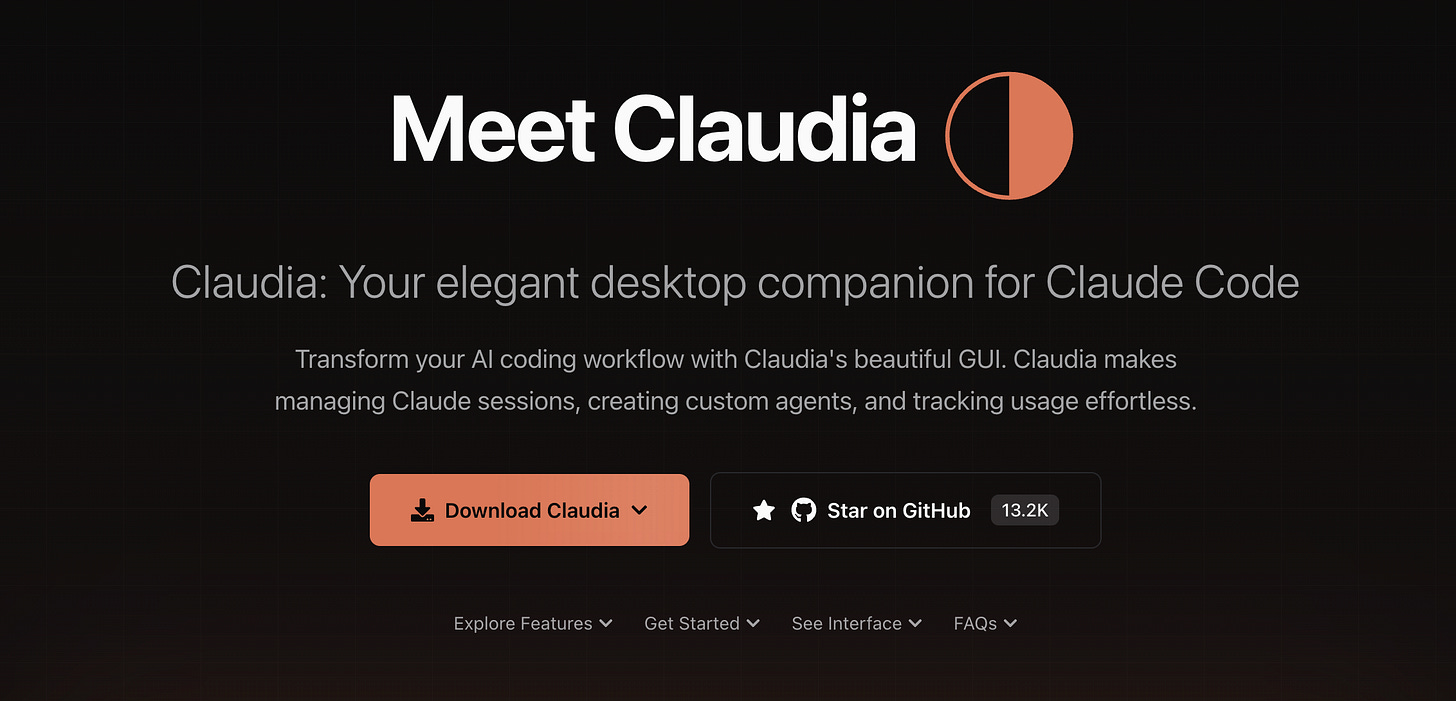ML for SWEs 64: What AI really means for software engineering jobs
The realistic take on 'software engineers being cooked' because AI can write code
Welcome to machine learning for software engineers. Each week, I share a lesson in AI from the past week, five must-read resources to help you become a better engineer, and other interesting developments. All content is geared towards software engineers and those that like building things.
A few weeks back, a friend shared an article with me entitled, "At Amazon, Some Coders Say Their Jobs Have Begun to Resemble Warehouse Work." I've always hated the term: coder. No one I know who works as a professional software engineer actually calls themselves a 'coder'. But my friend pointed out there are coders and the distinction between a coder and a software engineer is important.
A coder is someone who knows how to code. A software engineer is someone who understands how to build systems that solve problems with software. All software engineers are coders, but not all coders are software engineers.
This distinction is more important now than ever. AI has shown to be incredibly capable at coding but far less capable at engineering. In fact, 58% of engineers recognize that AI can code better than most humans (source by
). But AI has a much more difficult time writing accurate code within production-level systems (source by ).I remember a conversation I had with a neighbor back in 2018. He had just landed a six-figure job doing web development after completing a 6-month coding bootcamp. The undertone to our conversation was: Why would anyone complete a degree for a software engineering job when a bootcamp seemed to do the trick?
Back in 2018, becoming a coder really did work. It was enough to get your foot in the door of the tech industry. Over time, people would fill in the knowledge gap between a bootcamp and a full degree as they worked. Bootcamps effectively lowered the barrier to entry for software engineering jobs.
But with AI transforming jobs, this bar has been raised again. The coding skills that can be learned in 6 months can easily be taken over by AI. Since AI can do these things, employers no longer have the need to hire employees for them. Thus, the era of 'coders' (and bootcamps) is over.
Understanding how to use AI will be important, but identifying the skills AI isn't able to replace will be even more important. By now, we've all heard the saying, "AI won't replace you. Someone using AI will." I'll add another truth: "AI won't replace you, if you learn to do what AI can't."
The most important takeaway here is that this dilemma doesn't just apply to coders. It's about the transforming workforce in general. What's happening to software engineering will happen to every job.
In every job, there are 'coding skills' and there are 'engineering skills'. Some skills will be easily replaced by AI and others will heighten in value because they can't be.
So what should you do to prepare? You should:
Understand that AI won't take jobs instantly. It will transform jobs as it takes over the parts of those jobs it's good at.
Identify and get proficient in the pieces of jobs AI isn't good at.
If you want to know more about engineering versus coding, check out my article about Devin (the AI coding agent) exposing software engineers:
A question I have for all of you: What advice would you give to new software engineers that are just entering the field about working with AI? I get asked this a lot and I'm curious to hear your answers.
If you missed last week's ML for SWEs, you can catch it here:
We learned about how engineers just got a whole lot more important as the pure scaling era ends. Check it out and enjoy the resources below!
Must-reads
Model intelligence is no longer the constraint for automation - The definitive analysis of why intent specification and context engineering are now the bottlenecks for AI automation. Essential reading for understanding where engineering efforts should focus in the post-scaling era.
How to Create Powerful LLM Applications with Context Engineering - Practical techniques for maximizing LLM effectiveness through proper context management. Covers prompt structuring, context window optimization, and keyword search strategies that directly address the new engineering constraints.
The reality of AI-Assisted software engineering productivity - Real data on AI tool adoption: 84% of developers use them but only 60% view them favorably. Studies show 20-30% productivity gains, but 66% cite debugging AI solutions as a major time sink. Critical insights for realistic expectations.
Enabling Self-Improving Agents to Learn at Test Time With Human-In-The-Loop Guidance - Novel ARIA framework empowers LLM agents to continuously learn and adapt to evolving knowledge in real-time operational settings. Critical for building agents that can handle dynamic environments like regulatory compliance.
How to Use LLMs for Powerful Automatic Evaluations - LLM-as-a-Judge methodology for automating evaluation processes. As models become commoditized, evaluation and quality assurance become key differentiators. Essential technique for production ML systems.
Other interesting things this week
Infrastructure & Engineering
Tiny-tpu: A minimal tensor processing unit - Reinvented from Google's TPU V2 and V1, showing how hardware engineering enables AI advancement.
Google investing $9 billion in Oklahoma AI infrastructure - Includes data centers, education programs, and 135% increase in electrical workforce pipeline. Infrastructure investment signals long-term engineering focus.
Product Launches
GPT-5 and GPT-OSS models released - GPT-5 operates as multipart system with fast model, reasoning model, and real-time router. First open-weight models (gpt-oss-120b and gpt-oss-20b) since GPT-2.
Claude Sonnet 4 supports 1M tokens - 5x increase handles entire codebases with 75,000+ lines or dozens of research papers in single request.
Gemma 3 270M compact model - 270 million parameters optimized for task-specific fine-tuning, showing efficiency matters more than size.
OWhisper for realtime speech-to-text - Local lightweight models for prototyping, larger models for production. Engineering flexibility over model size.
Embedder (YC S25) – Claude code for embedded software - Hardware-aware AI coding agent that tests on physical hardware. Perfect example of engineering solving real problems models alone can't.
AI Developments
The AI Arms Race Is Over. Smart Engineering Won by
- GPT-5 shows less dramatic improvement than previous generations. Making AI useful now requires connecting to databases, internet, and breaking down complex problems.Google DeepMind CEO on world model capabilities - Deep Think in Gemini 2.5 and Genie 3's world model capabilities helping AI understand reality.
Perplexity offers to buy Google Chrome for $34.5B - Unsolicited bid higher than Perplexity's $18B valuation, showing ambition in AI search space.
Research & Analysis
Training language models to be warm makes them less reliable - Warm models show higher error rates, promote conspiracy theories, provide incorrect information. Engineering tradeoff between personality and accuracy.
A Comprehensive Survey of Self-Evolving AI Agents - Agents that automatically enhance using interaction data and environmental feedback. Focus shifting to continuous adaptation over static capabilities.
Ranking the Chinese Open Model Builders by
- Qwen 3, Kimi K2, Zhipu GLM 4.5 leading open source innovation. DeepSeek V3 and R1 major stories of 2025.
Security & Governance
Illinois limits AI in therapy and psychotherapy - Regulatory constraints are emerging around AI applications in sensitive domains.
Anthropic details its AI safety strategy - How they’re engineering safety into systems to teach Claude right from wrong.
Tools & Resources
YAMS – Yet another memory system for LLMs - Persistent memory with content-addressed storage, deduplication, semantic search. Engineering solutions for context management.
Sheet0 – Transform webpages to structured spreadsheets - Data agent solving practical extraction problems.
Claudia – Desktop companion for Claude code - Tool development for better AI coding workflows.
Career & Industry
How to speed up engineering velocity with AI - 58% of engineers believe AI codes better than most humans. Anthropic outlines using Claude Code across software lifecycle.
14 ways Googlers use AI to work smarter - Gemini and NotebookLM for code generation, content creation, data analysis. Real patterns of AI tool adoption.
Domain expertise matters more than algorithmic complexity - AI entrepreneur's key lesson after winning $10,000 in Web3 credit scoring competition.
Community Highlights
Have something to share? Building something cool? Written an article? Let me know and I'll feature it here next week!
If you found this helpful, consider supporting ML for SWEs by becoming a paid subscriber. You'll get even more resources and interesting articles plus in-depth analysis.
Always be (machine) learning,
Logan









For goodness sakes learn good system design principles and practices to understand what a well engineered system should look and behave like.
I am not a software engineer, however, I love building things.
I am also a disabled senior, so my mobility is affected.